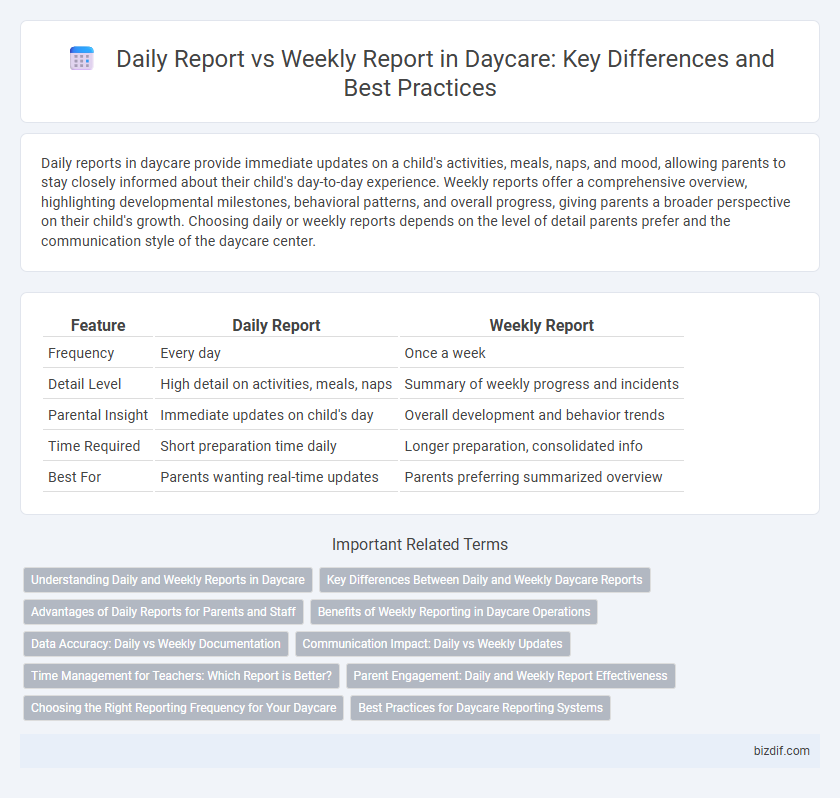Daily reports in daycare provide immediate updates on a child's activities, meals, naps, and mood, allowing parents to stay closely informed about their child's day-to-day experience. Weekly reports offer a comprehensive overview, highlighting developmental milestones, behavioral patterns, and overall progress, giving parents a broader perspective on their child's growth. Choosing daily or weekly reports depends on the level of detail parents prefer and the communication style of the daycare center.
Table of Comparison
| Feature | Daily Report | Weekly Report |
|---|---|---|
| Frequency | Every day | Once a week |
| Detail Level | High detail on activities, meals, naps | Summary of weekly progress and incidents |
| Parental Insight | Immediate updates on child's day | Overall development and behavior trends |
| Time Required | Short preparation time daily | Longer preparation, consolidated info |
| Best For | Parents wanting real-time updates | Parents preferring summarized overview |
Understanding Daily and Weekly Reports in Daycare
Daily reports in daycare provide detailed updates on each child's activities, meals, naps, and behavior, ensuring parents stay informed about their child's day-to-day experiences. Weekly reports offer a broader overview, summarizing developmental progress, social interactions, and learning milestones over the course of the week. Understanding both report types helps parents and caregivers track children's growth while addressing any immediate concerns promptly.
Key Differences Between Daily and Weekly Daycare Reports
Daily daycare reports provide detailed updates on a child's activities, meals, naps, and behavior each day, ensuring parents receive immediate insights into their child's well-being. Weekly daycare reports summarize trends and developmental progress, offering a broader overview of the child's growth and routine consistency over time. Key differences include the granularity of information and reporting frequency, with daily reports emphasizing immediate observations and weekly reports highlighting patterns and milestones.
Advantages of Daily Reports for Parents and Staff
Daily reports in daycare settings provide timely updates on a child's meals, naps, behavior, and learning activities, enhancing parental peace of mind and fostering effective communication between parents and staff. These frequent reports enable early identification of potential issues and support personalized care by allowing caregivers to track progress and adjust activities promptly. Staff benefit from clear, consistent documentation that improves coordination and ensures accountability in daily child development and safety practices.
Benefits of Weekly Reporting in Daycare Operations
Weekly reporting in daycare operations provides a comprehensive overview of children's development, behavior patterns, and health, enabling caregivers to identify trends and address issues proactively. It streamlines communication with parents by consolidating key information into one detailed update, reducing information overload and enhancing parental engagement. This practice improves operational efficiency by allowing staff to plan activities and resources based on aggregated data rather than isolated daily entries.
Data Accuracy: Daily vs Weekly Documentation
Daily reports in daycare settings provide real-time, precise documentation of a child's activities, behavior, meals, and naps, ensuring data accuracy through frequent updates. Weekly reports compile this information, offering broader trends and developmental insights, but they risk reduced accuracy due to reliance on memory or delayed entry. Maintaining daily documentation is essential for capturing immediate, exact details that enhance caregiving decisions and parent communication.
Communication Impact: Daily vs Weekly Updates
Daily reports in daycare settings provide immediate and detailed insights into a child's activities, behavior, and needs, ensuring timely communication between caregivers and parents. Weekly reports offer a broader overview of developmental progress and patterns, but may delay addressing specific concerns or changes. Frequent daily updates enhance responsiveness and foster stronger trust and collaboration through consistent, transparent communication.
Time Management for Teachers: Which Report is Better?
Daily reports provide teachers with real-time insights into each child's activities, behavior, and needs, enabling prompt adjustments and personalized care throughout the day. Weekly reports offer a broader overview, allowing teachers to identify patterns, assess progress, and plan curriculum effectively over time. For optimal time management, daily reports enhance immediate responsiveness while weekly reports support strategic planning, making a combination of both the most efficient approach.
Parent Engagement: Daily and Weekly Report Effectiveness
Daily reports enhance parent engagement by providing immediate updates on a child's activities, meals, and behavior, enabling timely communication and quick response to any concerns. Weekly reports offer a comprehensive summary of developmental milestones and social interactions, allowing parents to observe progress trends and participate more meaningfully in their child's growth. Combining both report types ensures balanced information flow, fostering stronger collaboration between caregivers and parents.
Choosing the Right Reporting Frequency for Your Daycare
Selecting the appropriate reporting frequency for your daycare hinges on balancing detailed daily updates with comprehensive weekly summaries. Daily reports provide immediate insights into each child's activities, meals, and naps, facilitating timely communication with parents and quick responses to any concerns. Weekly reports, on the other hand, offer a broader overview of developmental milestones and behavioral trends, helping caregivers and parents track progress over time and plan future learning goals effectively.
Best Practices for Daycare Reporting Systems
Daycare reporting systems benefit from combining detailed daily reports that track individual child activities, meals, naps, and behaviors with comprehensive weekly reports summarizing developmental progress and key milestones. Best practices emphasize using digital platforms for real-time updates, ensuring parents receive timely and accurate information while facilitating seamless communication between caregivers and families. Integrating multimedia elements, such as photos and videos in daily reports, enhances parent engagement, whereas weekly reports focus on overarching growth patterns and care plan adjustments.
Daily report vs Weekly report Infographic

 bizdif.com
bizdif.com